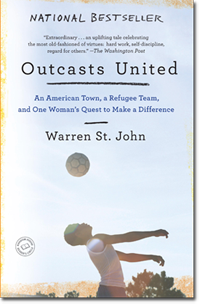Excerpt
When North Atlanta scored first, on a free kick, the team’s coach jumped up and down on the sidelines, while across the field parents leaped from their folding lawn chairs in celebration: more grating noise. Luma pursed her lips in a tiny sign of disgust and kept pacing, quietly. She made a substitution on defense but otherwise remained silent. A few moments later, Christian Jackson shook himself free on the right side, dribbled downfield, and fired a line drive into the top right corner of the net: goal. Luma betrayed no reaction other than to adjust her tattered white Smith College baseball cap and to continue pacing. The Fugees soon regained possession; they controlled the ball with crisp passes and moved into range of the goal. A Fugees forward struggled free of traffic to take a shot that flew a good twenty feet over the crossbar and into the parking lot behind the field, and soon after, let loose another that was wide by a similar margin. Luma paced. Meanwhile, with each of his team’s shots the North Atlanta coach shouted more instructions to his players, ever more adamantly. He was getting frustrated. If his players had followed his instructions to the word, they could’ve scored on Manchester United. But as it was, they ended the first half trailing the Fugees 3–1.
A 3–1 lead at halftime would have pleased most soccer coaches. But Luma was seething. Her head down, she marched angrily to a corner of the field, the Fugees following behind sullenly. They could tell she was unhappy. They braced themselves for what they knew was coming. Luma ordered them to sit down.
“Our team has taken nine shots and made three—they’ve taken two shots and made one,” she told them, her voice sharp and strident. “You’re outrunning them, outhustling them, outplaying them—why are you only winning three to one?
“Christian,” she said, looking at the boy who sat on the grass with his arms around his knees, his eyes downcast. “This is one of your worst games. I want it to be one of your best games. I want to sit back and watch good soccer—do you understand?”
At that moment, the voice of the North Atlanta coach—still screaming at his players—drifted down the field to the Fugees’ huddle. Luma pulled up and turned her narrowed gaze toward the source of the offending noise.
“See that coach?” Luma said, tilting her head in the direction of the screamer. “I want him to sit down and be quiet. That’s when you know we’ve won—when he sits down and shuts up. Got it?”
“Yes, Coach,” her players replied.
When the Fugees took the field for the second half, they were transformed. They quickly scored three goals—an elegant cross, chested in with highlight-reel grace by a Sudanese forward named Attak, followed by a cannon shot from Christian from ten yards out. Moments later Christian dribbled into the box and faked to his left, a move that left the North Atlanta goalie tangled in his own limbs, before shooting right: another score. The opposing coach was still yelling—“Man on! Man on!”—so the Fugees kept shooting. Another goal. And another. When the frustrated North Atlanta players started hacking away at their shins and ankles, the Fugees brushed them off and scored yet again. At 8–2, the North Atlanta coach, hoarse now nearly to muteness, wiped the sweat from his forehead with the back of his hand, quietly wandered over to his bench, and sat down, flaccid and defeated. The Fugees tried to stifle their smiles. If Luma felt any sense of satisfaction, it was difficult to discern. She remained perfectly stone-faced. The referee blew his whistle three times to signal the end of the game. The final score was 9–2 Fugees. Christian Jackson had scored five goals.

